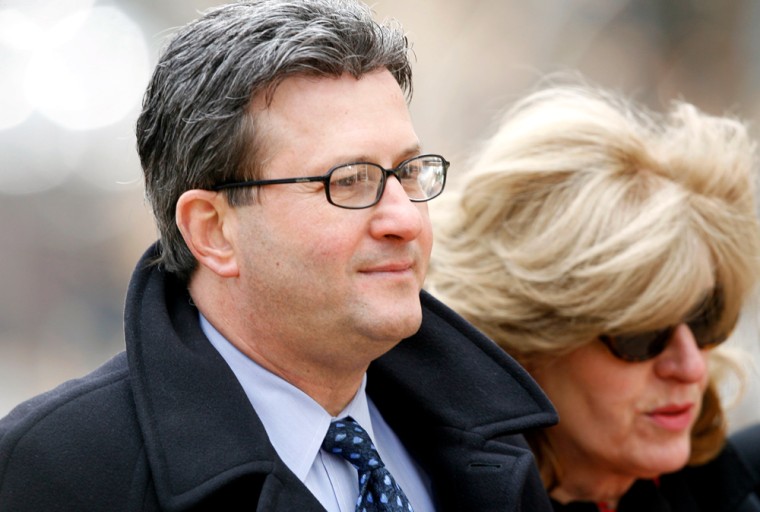A federal appeals court ordered a new trial Monday for former Qwest CEO Joe Nacchio, saying the trial judge wrongly excluded expert testimony important to Nacchio’s defense in his insider trading case.
The court also ordered a new judge to hear Nacchio’s case.
Nacchio was convicted in April on 19 counts involving the sale of $52 million worth of Qwest stock in 2001. He was sentenced to six years in prison but remained free on appeal. Jurors acquitted Nacchio of 23 counts.
Prosecutors argued Nacchio sold the stock when he knew Denver-based Qwest Communications International Inc. was at financial risk but didn’t tell investors. U.S. Attorney Troy Eid had called the case the largest insider trading prosecution in the nation based on the number of counts, the amount of money involved and the length of the prison term.
“This is a setback, not a defeat,” Eid said in a statement Monday. “The good news is the circuit court said our trial team presented sufficient evidence to convict Mr. Nacchio of insider trading.”
Nacchio attorney Maureen Mahoney in a statement said: “If the government decides to retry the case, we expect him to be acquitted.”
Attorneys for Nacchio told the 10th U.S. Circuit Court of Appeals in December the case against him didn’t meet standards set by previous court rulings. Mahoney also told the court that U.S. District Court Judge Edward Nottingham wrongly prevented defense witness Daniel Fischel from testifying.
The appeals court rejected Mahoney’s argument that Nottingham’s instructions to the jury were inadequate. It also rejected an argument that the government failed to introduce sufficient evidence to convict Nacchio, which if true would have meant Nacchio could not have been retried under the double jeopardy clause.
At the appeals hearing, the judges repeatedly asked government prosecutor Stephan Oestreicher Jr. why Nottingham denied Fischel from testifying.
Nacchio’s attorneys say Fischel, an expert on corporate law and markets, was a core part of his defense and could have explained to jurors what must be publicly disclosed and that Nacchio’s stock sales were to diversify his portfolio. Mahoney said a reasonable jury hearing testimony from Fischel would have acquitted Nacchio.
Prosecutors say the defense didn’t establish the reliability of Fischel’s opinions or disclose how he arrived at them.
The three-judge appeals panel focused on how Nottingham simply announced his decision to forbid Fischel from testifying after accepting written arguments from both sides. Two members of the panel noted how Nottingham silenced a defense attorney who asked to speak, saying he had already ruled because the defense didn’t disclose Fischel’s methodology.
Nottingham concluded that expert economic analysis would “invite the jurors to abandon their own common sense and common experience and succumb to this expert’s credentials.”
“When the court does not allow a lawyer to present arguments, we will not penalize him for failing to present them,” two members of the appeals panel wrote.
The third member, Judge Jerome Holmes, said the majority opinion “elevates form over substance” and said Nottingham was correct to exclude Fischel.
Nacchio maintained he was optimistic about Qwest’s future because he knew of potential contracts the company could land from secret government agencies. He did not present that argument during his trial.
All three judges agreed in Monday’s ruling that information about government contracts could not exonerate Nacchio, even if presented.
The case grew out of a multibillion-dollar scandal that forced the telecommunications company to restate $2.2 billion of revenue. Federal regulators have said Qwest falsely reported fiber-optic capacity sales as recurring instead of one-time revenue between April 1999 and March 2002.
Prosecutors argued Nacchio knew his company was at financial risk at the time he was selling shares but didn’t tell investors. His sales came before Qwest shares plummeted.
Mahoney had argued that Nacchio’s stock sales were not based on nonpublic information and that he had announced his decision to sell shares well in advance.
She also said Nacchio’s sentence was calculated incorrectly.
Mahoney said former Chief Financial Officer Robin Szeliga had told Nacchio roughly $1 billion of revenue in Qwest’s internal budget of roughly $22 billion was at risk, an amount Mahoney argued was not material.
Mahoney said court precedents found that for interim company results to be material, they must suggest an “extreme departure” from how the public expects a company to perform. She argued Qwest’s situation didn’t meet that requirement.
Oestreicher told judges the case wasn’t strictly about numbers but the fact that unknown to the public at time, Qwest’s business plan was failing. He also argued that Nacchio had told his employees that missing public financial targets by just $50 million was huge because Qwest’s stock would get “whacked.”
In its ruling, the appeals court said that “it would be unreasonably difficult to expect this judge (Nottingham) to retry the case with a fresh mind.”
Nacchio still faces a civil fraud lawsuit filed by the Securities and Exchange Commission against him and four other former Qwest employees. The SEC alleges they coordinated a financial fraud that allowed Qwest to improperly report approximately $3 billion in revenue. Qwest later restated its revenue to erase $2.2 billion.
